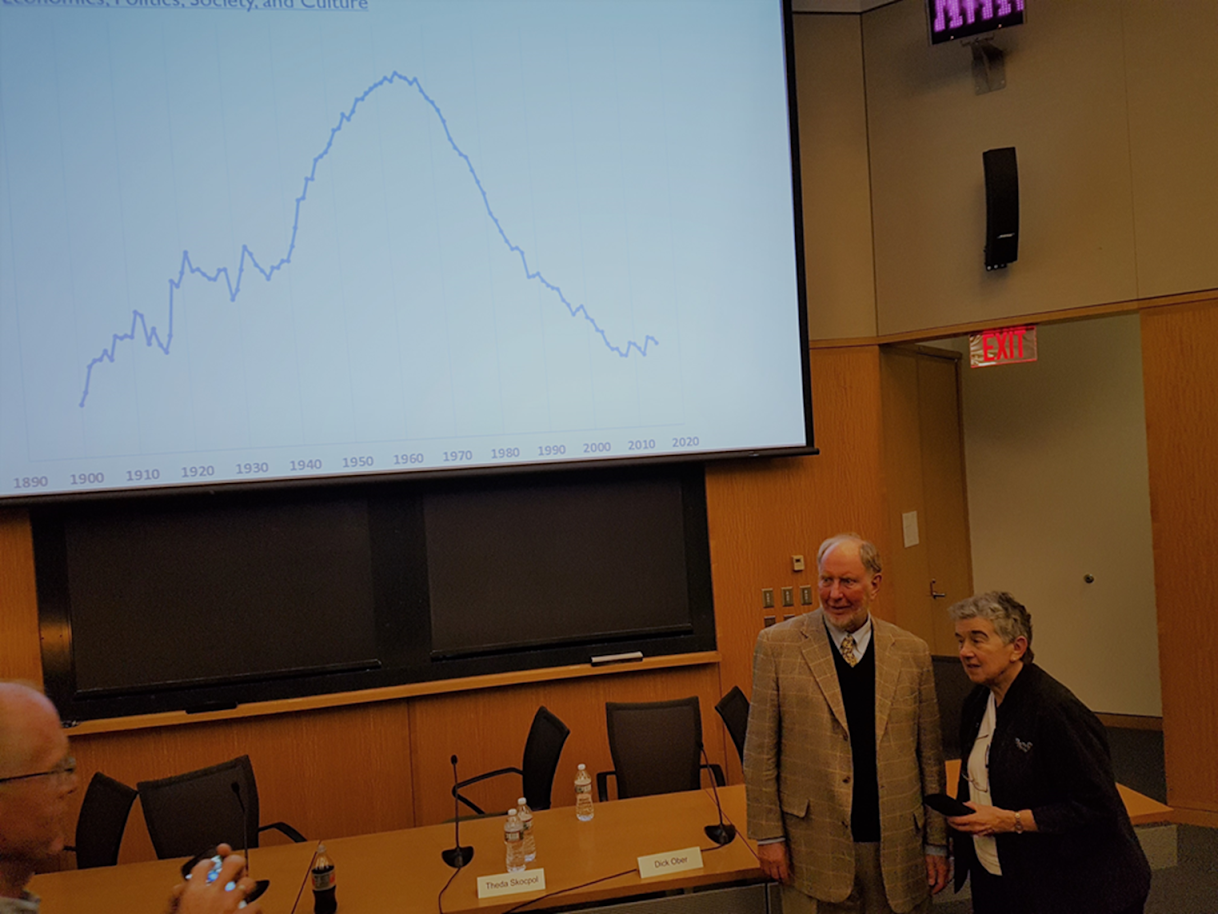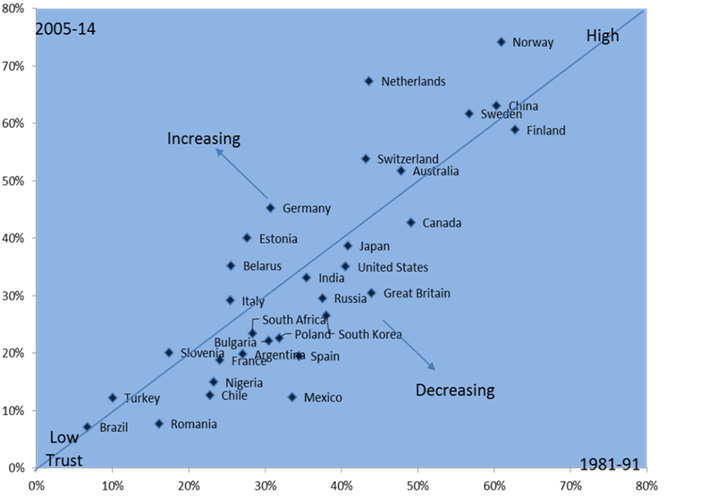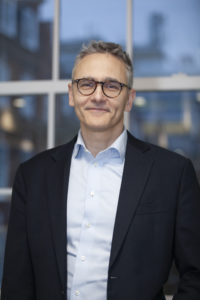There’s lots of hyperbole around, but it’s not difficult to argue that Robert Putnam is the most impactful political scientist alive.
It was a strange blend of emotions, then, for those of us gathered at Harvard to mark his retirement last week. Most scholars hope to achieve a major breakthrough in their career. Putnam achieved at least five:
- Two-level game theory of political negotiation
This set out how political leaders at summits are at once negotiating with each other across the table, and with their complex constituencies behind them at home. To take a topical example, two-level game theory can help to explain how leaders with fragile majorities can sometimes get a better deal in international negotiations, since their partners at the top table know they have to give more ground to get a deal done. - Making democracy work
Building on a seemingly obscure study of regional government in Italy, Putnam and his collaborators showed that the performance of governments was driven less by economics or the structure of government itself, than by the strength of the social fabric among the governed. More choral societies, stemming from a culture of cooperation and civility which they take care to nurture, make for good citizens and good government. - Bowling Alone
Returning from Italy, Putnam wondered whether a decline in this ‘social capital’ might explain growing concerns about the state of political and social life in America. Though initially dismissed, five years and an unprecedented stack of graphs later, Putnam showed that there had indeed been deep-seated changes in the fabric of social connection and mutual trust in American society. - American Grace
Putnam’s focus turned to the great curiosity of American life: how, despite the tapestry of beliefs held by Americans – among the most religious people in the world – they somehow seemed to get along with each other. Putnam, with David Campbell, showed how religious communities produced civic Americans, and how – despite the official pronouncements of their leaders – they meshed in such a way as to be simultaneously tolerant of other religions.
[As an aside, evidence from Campbell and others at the event last week suggests a somewhat darker picture for the decade since, with a hollowing out of the more liberal traditions in US religion, and a rise of the ‘nones’ (no religious affiliations, now more than ¼ of Americans) ] - Our Kids
Thought by Robert’s wife, Rosemary, to be his best book, this is a meticulous combination of ethnography and data, documenting how the lives and experiences of the bottom 50 per cent of Americans has come apart relative to the top 10-20 per cent. As with all Robert’s later works, it concludes with a plan for what might be done to address the issue. It is rumoured to have sold more than a million copies, and spurred a new generation of activists.

Robert and Rosemary Putnam at the end of his retirement conference in Harvard last Friday. The graph up on screen behind them is a composite of multiple indicators of social capital and affiliation in America from 1900 to 2015.
In self-effacing style, last week Robert argued that most of his best ideas came from other people, and his contribution was to think of a good metaphor to express them. Maybe. There are few scholars ‘so able to move from a viewpoint from 35,000ft, to the sweep of a dust-cropper’, as one conference contributor put it.
As we spent the day and evening together, there was a striking echo between the study of social capital, and Robert’s own story. Was it really that Putnam possessed a social science superpower, as Robert Axelrod suggested? Or was it, at least partly, that Putnam was himself a master of building social capital – establishing trust and relationships across such a wide group of scholars, practitioners, and citizens?
His questioning mind, like steel on flint, has always asked interesting questions. But it is the tinder of colleagues and students he has nurtured around him that have turned these sparks into intellectual fires, and to find answers where others saw only questions. Without this rich tapestry of colleagues, students and family, even Putnam would have not have succeeded, especially on quests and evidence-gathering that often stretched over decades.
Will Putnam write another book? He has at least one great question that he feels, I think rightly, that we have yet to truly answer. As Robert’s work has shown again and again, twentieth century America was characterised by a great rise of civic life that rose, with a few falters in the 1910s and 1930s, for two-thirds of the century. Then, around 1965 – or about when Robert first voted, as he likes to joke – the trend reversed. For the next 40 years, virtually every measure of social capital falls – a pattern fairly similar across many Western countries, and Anglo-Saxon nations in particular.
Many explanations have been offered. Television. Increases in inequality. Even the (re)entry of women into the labour market, or advances in minority rights. But none quite convince. Many are covariates and hard to separate causally. Other seemingly plausible candidates, such as key economic indicators, either don’t match or lag rather than lead the direction of change.
Robert is working on one ‘last, last book’. It is an attempt to answer this great question, and with it to learn lessons about what we might do to reverse this ‘arc of history’. In my view, we need to look as much at those countries – such as the Nordic nations – that seem to have taken a very different path over the century. It is in these differential trajectories that we may find our answers.
Figure 1: Percentage believing that “most people can be trusted”, in the period 2005-14 compared to 1981-91. Countries in the upper-left half have had increasing levels of social trust over the period.

Source: World Values Survey
But we also need to find solutions, not least to pressing questions around community integration. These might include our own findings on connecting young people as part of the UK National Citizen Service.
As it happens, the BBC is today launching ‘Crossing Divides’, a series about creating connections in a polarised world. Echoing much of Putnam’s work, it documents over 40 stories from around the world about encounters across the lines of race, religion, class, politics and age. As Emily Kasriel, who masterminded the series, puts it: ‘I hope that these stories may, in a small way, have a transformative impact on our audiences, as they witness the bravery of people who choose to engage with others who are at best strangers and at worst enemies.’ For more information, here’s a 2 min video and blog post.
Over the last 50 years, Putnam has advised a succession of Presidents, as well as a stint in government himself early in his career, and met with leaders across the world. On Friday, his voice breaking with emotion, he shared memories of hearing Kennedy speak in 1961 – the President famously exhorting Americans to ‘ask not what your country can do for you — ask what you can do for your country’.
The Putnams clearly answered that call. Along with his lifetime of landmark studies, Robert has spent recent years criss-crossing the US for talks and engagements with voluntary associations and communities, as well as finding the time to guide and encourage generations of students. Rosemary Putnam, meanwhile has spent a life in service, including teaching and mentoring kids across the social divide.
I very much suspect we’ll hear more from Robert yet, but regardless, it’s time for a new generation to answer his call. Maybe the plateauing of social capital in the last few years of US data, after four decades of falls, could yet turn into the long awaited rise to echo that of the previous century.
